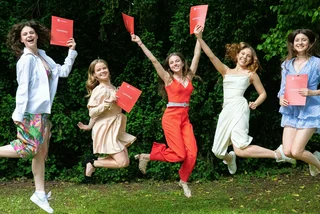The high-stakes season for Czech high school entrance exams begins this Friday, April 11, as thousands of ninth-graders sit for standardized tests that will determine their future educational paths. But as competition intensifies, education experts warn that foreign students are being left behind.
At a recent conference on migration and education, NGO META and the Czech Government’s Human Rights Office raised alarm bells about the widening gap in outcomes between Czech and migrant pupils, especially in high school diploma programs.
According to data presented at the conference, Only about 25 percent of migrant students continue to secondary school after primary, compared to 90 percent of their Czech peers. In Prague, fewer than 20 percent of Ukrainian teens, for example, attend high school. The disparity is stark: while nearly every Czech ninth-grader is expected to make the transition, most foreign-born students never even have a fair shot.
Experts blame unequal access to test prep, language barriers, and the lack of systemic support for children who’ve only recently arrived in the country.
Prague: Multilingual Student Statistics (September 2024)
Total foreign students: 20,809
Refugees (from Ukraine): 8,542
Students with insufficient Czech language skills: 4,973
Students eligible for language preparation: 4,200
Students participating in language preparation: 3,708
Source: META
“Without strong Czech language skills or a deep understanding of the education system, these students face limited choices that rarely reflect their true interests or potential,” said Zuzana Papáčková, director of META. The stakes are especially high for older teens who arrive just before or after completing compulsory education. “They are the most vulnerable—and the most overlooked.
Language barriers, lack of tailored preparation, and the rigid nature of the admissions process all play a role. Experts argue that the current DiPSy application system, which matches students to schools based on exam scores and ranking preferences, offers little leeway for those still learning the language or adapting to a new education system.
But the issue runs deeper. “The problem isn’t just the language,” said Human Rights Commissioner Klára Šimáčková Laurenčíková in her keynote address. “It’s the structure. We urgently need systemic reform that creates equal opportunities for all students—regardless of where they were born or how long they’ve lived here.”
One proposed solution is the introduction of “zero-year” preparatory programs that offer intensive Czech language instruction and cultural orientation before students enter the admissions track. Experts also called for greater coordination between ministries, municipalities, and schools, and the integration of better data collection to guide policymaking.
Czech students face challenges as well
While migrant students face these additional hurdles, even Czech students struggle with the admissions process, particularly in highly competitive fields.
The demand for places in high school diploma programs exceeds the available capacity in popular fields, especially in large cities. This year, according to the Ministry of Education, 124,650 students will take the unified entrance exam for secondary schools, roughly 3,300 more than last year.
Many families rely on expensive preparatory courses, which deepen the gap between students from different socio-economic backgrounds.
While the exams generally test what’s covered in school, they tend to focus on complex tasks that many students may not have encountered, as their studies tend to focus on isolated subjects like grammar or math rather than the problem-solving required in the exams.
Papáčková stressed that reforming the admissions process would benefit all students, not just migrants. “We want a fairer system for everyone. Change is possible—and it matters not just for one group, but for society as a whole.”












 Reading time: 3 minutes
Reading time: 3 minutes 






















